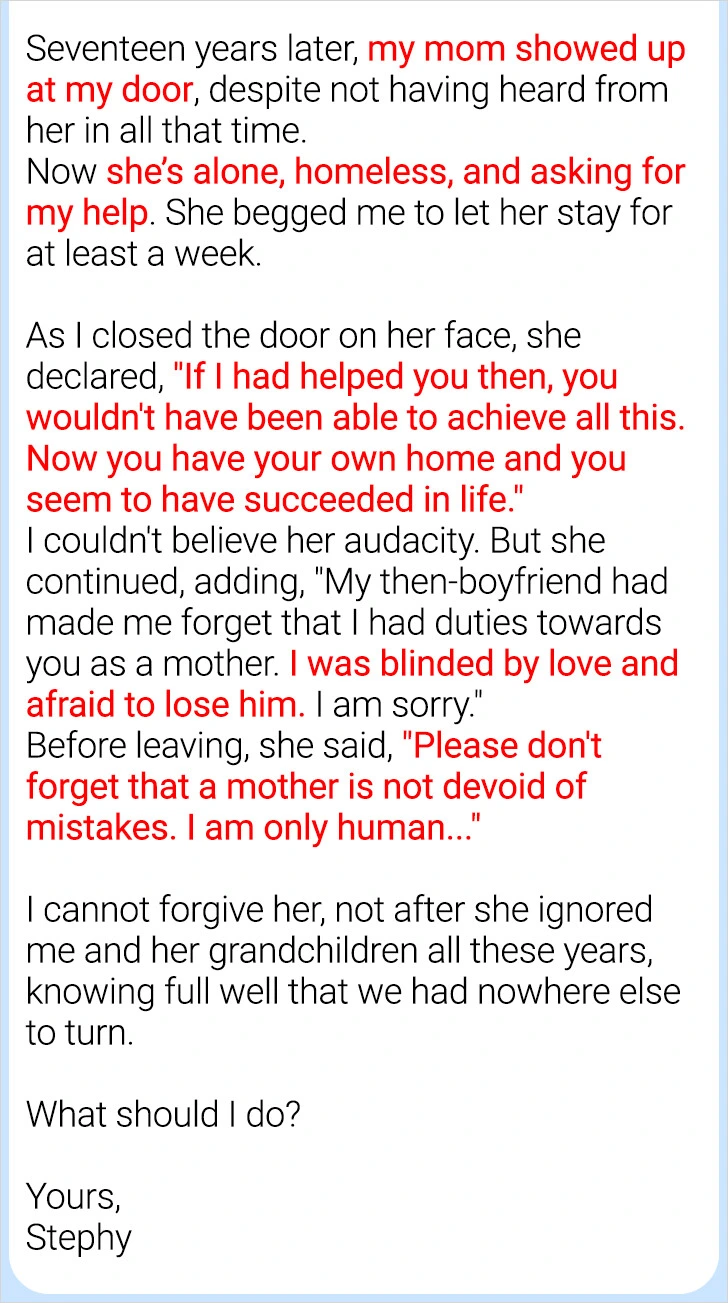Our mother is supposed to be our biggest support and ally in times of need, yet reality doesn’t always align with our expectations. At 24, Stephy found herself facing the darkest period of her life, with three kids and nowhere to turn but to her own mother. However, her mom’s refusal to assist left Stephy in a difficult position. Now, years later, her mother is the one seeking help from her daughter. Stephy reached out to us seeking advice on how to navigate this complex situation.
This is Stephy’s letter:



Thanks for sharing your story with us, Stephy! We’ve prepared some tips that we hope can be useful.
Set boundaries.

It’s essential to establish clear boundaries to protect yourself and your family’s well-being. While it’s understandable to feel a sense of obligation towards your mother, it’s crucial to prioritize your own mental and emotional health, as well as that of your children.
Politely but firmly communicate your boundaries to your mother, explaining that while you empathize with her situation, you cannot accommodate her request to stay with you. Offer alternative forms of support, such as connecting her with local shelters or social services that can provide assistance.
Seek closure through communication.

Consider initiating a conversation with your mother to express your feelings and seek closure. While it may be challenging to confront her about past actions, expressing your emotions can be a cathartic step towards healing.
Be honest about the pain her absence caused you and your children, but also try to understand her perspective. This conversation can provide both of you with an opportunity to acknowledge past mistakes and potentially rebuild your relationship on new terms, even if it doesn’t involve her staying with you.
Focus on self-care.

Prioritize your own well-being and that of your children during this emotionally taxing time. Ensure you’re taking time to rest, recharge, and engage in activities that bring you joy and fulfillment.
Consider seeking support from a therapist or counselor who can provide guidance and help you process your feelings towards your mother’s sudden reappearance.
By prioritizing self-care, you’ll be better equipped to handle difficult emotions and make decisions that align with your values and needs.
Empower yourself through forgiveness.

Consider forgiveness as a powerful tool for your own emotional liberation. Forgiveness doesn’t necessarily mean condoning or forgetting your mother’s past actions; rather, it’s a process of letting go of the anger, resentment, and bitterness that may be holding you back.
Remember that forgiveness is a journey, and it’s okay to take your time and seek support as you navigate through it. As you embrace forgiveness, you reclaim your power and agency, paving the way for a brighter future for yourself and your children.
Clarissa is another young woman with a complicated history with her mother. Throughout her life, Clarissa believed she was abandoned by her mother, only to have her return years later with an entirely different narrative. Now faced with conflicting stories, Clarissa is unsure whether she can trust her mother’s words.